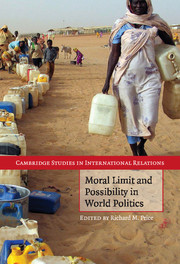Book contents
- Frontmatter
- Contents
- List of contributors
- Preface
- 1 Moral limit and possibility in world politics
- 2 Constructivism and the structure of ethical reasoning
- 3 The role of consequences, comparison and counterfactuals in constructivist ethical thought
- 4 Sovereignty, recognition and indigenous peoples
- 5 Policy hypocrisy or political compromise? Assessing the morality of US policy toward undocumented migrants
- 6 Lie to me: sanctions on Iraq, moral argument and the international politics of hypocrisy
- 7 Paradoxes in humanitarian intervention
- 8 Inevitable inequalities? Approaching gender equality and multiculturalism
- 9 Interstate community-building and the identity/difference predicament
- 10 Progress with a price
- Index
- Cambridge Studies in International Relations
- References
7 - Paradoxes in humanitarian intervention
Published online by Cambridge University Press: 14 May 2010
- Frontmatter
- Contents
- List of contributors
- Preface
- 1 Moral limit and possibility in world politics
- 2 Constructivism and the structure of ethical reasoning
- 3 The role of consequences, comparison and counterfactuals in constructivist ethical thought
- 4 Sovereignty, recognition and indigenous peoples
- 5 Policy hypocrisy or political compromise? Assessing the morality of US policy toward undocumented migrants
- 6 Lie to me: sanctions on Iraq, moral argument and the international politics of hypocrisy
- 7 Paradoxes in humanitarian intervention
- 8 Inevitable inequalities? Approaching gender equality and multiculturalism
- 9 Interstate community-building and the identity/difference predicament
- 10 Progress with a price
- Index
- Cambridge Studies in International Relations
- References
Summary
The rash of humanitarian interventions since the end of the Cold War has posed serious analytical problems for International Relations (IR) scholars. Traditional security scholars have struggled to understand the nature of ‘humanitarianism’ as an interest, often with the result that they simply discount it and emphasise other possible motivations for intervention. In these analyses, the intervention in Somalia is explained as an effort to export US values, intervention in Haiti was about controlling unwanted refugee flows, interventions in Bosnia and Kosovo are explained by the need to protect NATO's (North Atlantic Treaty Organization) credibility and maintain stability in Europe. Humanitarianism was only window-dressing in every case. Constructivists, legal scholars and an increasing number of policy analysts have taken humanitarianism more seriously as a source of state action. They point to the increasingly dense network of human rights norms, law and transnational activist groups that all persuade (or coerce) policy makers and publics to support these interventions. The analytic problem for this group has been to understand why humanitarianism produces the sorts of actions it does in world politics and why its influence and effects seem so inconsistent and varied. Humanitarian concerns do not always produce interventions (as the Rwanda case makes painfully clear) nor do they produce interventions of the same kind.
- Type
- Chapter
- Information
- Moral Limit and Possibility in World Politics , pp. 197 - 224Publisher: Cambridge University PressPrint publication year: 2008
References
- 12
- Cited by



